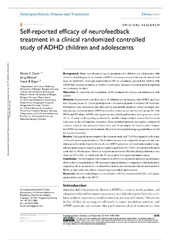Self-reported efficacy of neurofeedback treatment in a clinical randomized controlled study of ADHD children and adolescents
Peer reviewed, Journal article
Published version
Permanent lenke
https://hdl.handle.net/1956/8897Utgivelsesdato
2014-09-02Metadata
Vis full innførselSamlinger
Originalversjon
https://doi.org/10.2147/ndt.s66466Sammendrag
Background: Many non-pharmacological treatments for children and adolescents with attention-deficit/hyperactivity disorder (ADHD) have been attempted, but reports indicate that most are ineffective. Although neurofeedback (NF) is a treatment approach for children with ADHD that remains promising, a variety of appropriate measures have been used in reporting and evaluating its effect. Objective: To report the self-evaluations of NF treatment by children and adolescents with ADHD. Methods: Randomized controlled trial in 91 children and adolescents with ADHD, aged less than 18 years (mean, 11.2 years) participated in a 30-session program of intensive NF treatment. Participants were randomized and allocated by sequentially numbered sealed envelopes into three groups: methylphenidate (MPH) as an active control group, and two trial groups NF with MPH, and NF alone. ADHD core symptoms and school performance were given on a scale of 1 to 10 using a self-reporting questionnaire, and the changes in these scores after treatment were used as the self-reported evaluation. Basic statistical methods (descriptive, analyses of variance, exact χ2 test, and paired t-test) were used to investigate the baseline data. Changes in ADHD core symptoms and treatment effects were investigated using a general linear model for repeated measures. Results: Eighty participants completed the treatment study and 73 (91%) responded sufficiently on the self-reporting questionnaires. The treatment groups were comparable in age, sex, and cognition as well as in the baseline levels of core ADHD symptoms. All treatments resulted in significant improvements regarding attention and hyperactivity (P<0.001), and did not differ from each other in effectiveness. However, a significant treatment effect in school performance was observed (P=0.042), in which only the NF group showed a significant improvement. Conclusion: The self-reported improvements in ADHD core symptoms and school performance shortly after treatment indicate NF treatment being promising in comparison with medication, suggesting NF as an alternative treatment for children and adolescents who do not respond to MPH, or who suffer side effects. Further long-term follow-up is needed.

